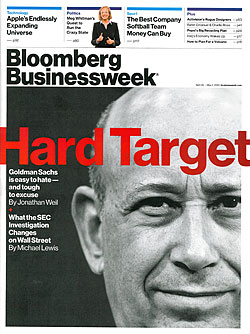
[another piece from the Tabb Forum series:]
For folks in finance, change is nothing new. They’ve long watched technology race ahead and markets shift, long been subject to tectonic changes that left stock exchanges and investment banks to adjust or die. Their world is littered with such relics as stock-quote tapes and Quotron devices, along with fading memories of once-titanic names (remember E.F. Hutton and Paine Webber). Wall Streeters have learned to roll with the punches.
But for those in the media business, change is surprisingly difficult. Newspapers, magazines and even TV networks become “venerable” after a few decades, and they are thought to be immortal, at least by others in the biz. Most of the scribblers who people the offices of the leading media outfits believed – until recently at least – that their institutions would far outlast them. Storied names, such as Newsweek or BusinessWeek, would never go away.
As the Washington Post Co.’s move to put Newsweek on the block shows, however, nothing in any business really lasts forever. Creative destruction is the way of capitalism, whether on the floor of the New York Stock Exchange or in the offices of a weekly news magazine. Newsweek has been eclipsed by the Net, just as the historic role of specialists has been made all but irrelevant by electronic trading. The weekly could easily go the way of Life and Look magazines, pubs done in by TV and the popularization of cameras.
Will Newsweek survive under a new owner? Maybe. Surely, some wealthy character eager to burnish his or her global rep will snap it up for the power and influence it still commands – at least for now. It will likely become a plaything for some mogul, perhaps a Chinese or Middle Eastern potentate, who wants the access to political leaders the media still brings. Almost surely, it will have to be someone who doesn’t mind losing a lot of money on the mag as a tradeoff for the benefits that come along with a big media property.
But will the product be the same? And will it endure? Certainly, a new owner would make a mark on the magazine, for good or ill. In Newsweek’s case I fear that it will be for ill, since the folks there now have a pretty good idea of how to produce a quality newsweekly. Adding to what they already do well – or, more likely, cutting – could be problematic. The people there now are pros and tinkering with their approaches seems doomed to come to grief.
Of course, it all depends on the owner. Bloomberg bought BusinessWeek last fall and, so far, has managed to make some notable improvements. The editors, by reaching into BW’s past and adding some nifty contemporary touches, are turning out a product that boasts of lots of promise again. It’s a far better book than the thin glossies that have marked the last few years. Editorially, Bloomberg’s market-savvy journalists add value, and the parent’s financial backing may just see the pub through until advertisers want in again. However, it’s an open question whether BW’s cachet and exposure to 4.5 million readers – taking the Bloomberg name to more places than the outfit reaches through its 300,000 terminals – will need to be underwritten forever.
Newsweek is a tougher case. So many news organizations are so hard-pressed that it’s tough to see which could be a natural buyer. The synergy issue is crucial. And non-news owners – the moguls – may tire of their toy quickly, especially if they add no real value. Worse, its readership could fast erode, as the Net’s inexorable march proceeds. Yes, the staff will produce versions for the iPad, Kindle or Nook that readers can buy. But will the public want the book even then? While BW does add value for a specialized audience – folks in the capital markets can attest to that – Newsweek by definition serves a broad audience. The mass market seems far less interested in its kind of journalism anymore. Instead, it prizes immediacy and multi-media approaches.
In the end, imagination and technology will dictate the future for people in finance and media alike. The adjustment can be brutal – just ask the scores of talented people BW and Newsweek have lost in the last couple years. Or ask all those bright folks who once populated the mighty investment banks that no longer stride the earth, gone the way of the dinosaurs. Standing outside the process, it becomes clear that the public is better served after the system’s creative destruction has reshaped things. But, now, in the middle of it, it’s hard to see little but rough road ahead for a while. To the good folks of Newsweek, godspeed.


